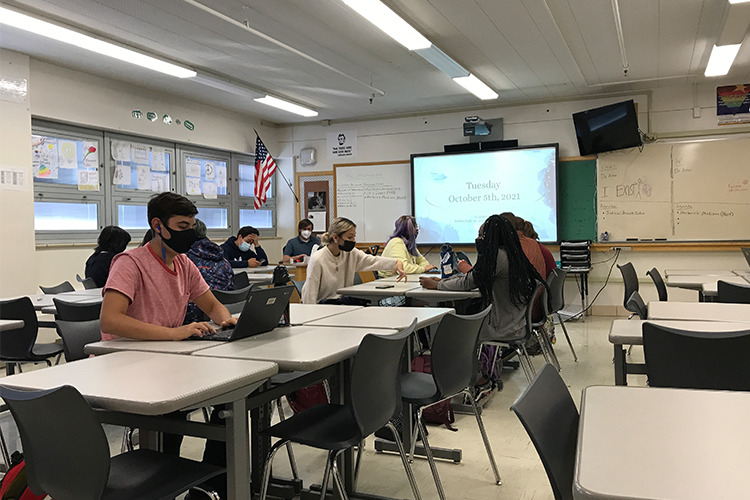
AP Government and Civics teacher James Stephenson instructs an advisement class. photo by Ben Morlan
TJ is now offering more academic, social/emotional, and future planning support with the revamped Advisement class.
When students got their class schedules on their first day of school, they probably noticed that there was an extra class, “advisement,” added to their schedule in addition to their six or seven classes. Many have asked what it was for, and wondered why it takes place twice a week, compared to once a week last school year.
Natalie Koncz, the school psychologist, said that the idea of an advisement period came from teachers, administration, and support staff. She said there was “a general feeling of ‘wow, this could be really cool to offer to our students, and we could do all sorts of fun stuff in there. We could do competitions, we could do academic support, we could do mental health, we could do college.’” These discussions led to the advisement period being inserted into student schedules during the virtual year, but were significantly watered-down and more makeshift than originally intended due to the fact that school was still online. As such, the main goal of advisement shifted to providing social and emotional support to students during the pandemic, which was strongly encouraged by Denver Public Schools and supported by administrators.
“We know that last year was really hard for almost everyone. It was not a great year‒ there were a lot of changes, there was a lot of adjusting, there was a lot of loss, and so our idea of what advisement was last year was just to provide additional resources and support for our students, and I do think it succeeded in that way,” she said. However, the initial program was not perfect. Koncz stated that one of the biggest shortcomings of advisement last year was that it was right at 7:30 in the morning, a time when students were still waking up to prepare for their classes at 8:00am. Furthermore, some of the guest speakers expressed concerns that the topics they came to discuss were too heavy for students who may have just rolled out of bed five minutes ago.
Some topics discussed in advisement received highly positive feedback, though. ICAP lessons with the counselors were ranked the highest, followed by the End Violence speakers who came in to talk about healthy relationships, and lastly, stress coping methods like body scanning, finger breathing, and gratitude flip.
Going into the first in-person school year since the onslaught of the COVID-19 pandemic, the top priorities for advisement were to offer study skills, college and career planning, and peer connection opportunities twice a week. “We knew that our students and our teachers were going to have, basically, a year and a half of lost connections and community. And so, the intention was to increase the time to two days a week and build those families within the advisement class, and have that be a space where kids feel welcome, and if they do not know anyone, they are meeting new people.” Counselor Jillian Gleason said that another goal for advisement was to help students foster connections with an adult in the building in a non-academic way.
The reception of advisement among students is difficult to gauge because school has just begun, but a survey recently sent out which included the question, “I find advisement valuable,” found that 46% of students were “unsure,” 37% said “yes,” and 17% said “no.” Koncz and Gleason said that these are baseline readings and that another survey would be sent out at the end of the semester to see if anything has changed. Administrators ensure that students have a voice in their education by having each advisement class elect a representative to whom students can relay their concerns. In addition, they will meet with administrators twice a semester to discuss what is going well, what is not working, and what adjustments can be made.
Koncz described the reception of advisement among the TJ staff as a “mixed bag.” She said that some were very excited about it, some had advisement or homeroom in high school, and still have lifelong friends from that experience. Others were hesitant because they were concerned that advisement, like last year, would be very social/mental health heavy, and did not feel comfortable in their ability to deliver that content. As such, five of the ten people on the curriculum team are teachers, allowing nearly every department to be represented. Gleason claims that this system lets them develop the advisement curriculum “through a teacher lens” so the content can be delivered “with fidelity and comfort.” Admin recently sent out a survey to the staff to measure their feelings about advisement. However, some teachers have gone ahead and voiced their feedback to the team directly. Some have said that many are participatory in class, others have said it is hard to get students to talk.
Students also noticed that office hours have disappeared from their schedule. Gleason said, “office hours were very poorly attended by the students who were really struggling in the classes, so it wasn’t really effective because there was no attendance taken, and most students just left at 2:15.” The hope this year, she continued, is that the required class will give students the study skills and academic support they need. Additionally, many TJ staff already offer extra support, like after-school tutoring or help during lunch.
Both Koncz and Gleason agreed that advisement is too new to gauge how the TJ community feels about it. However, they feel optimistic that it will help students in academic, social, and community situations.